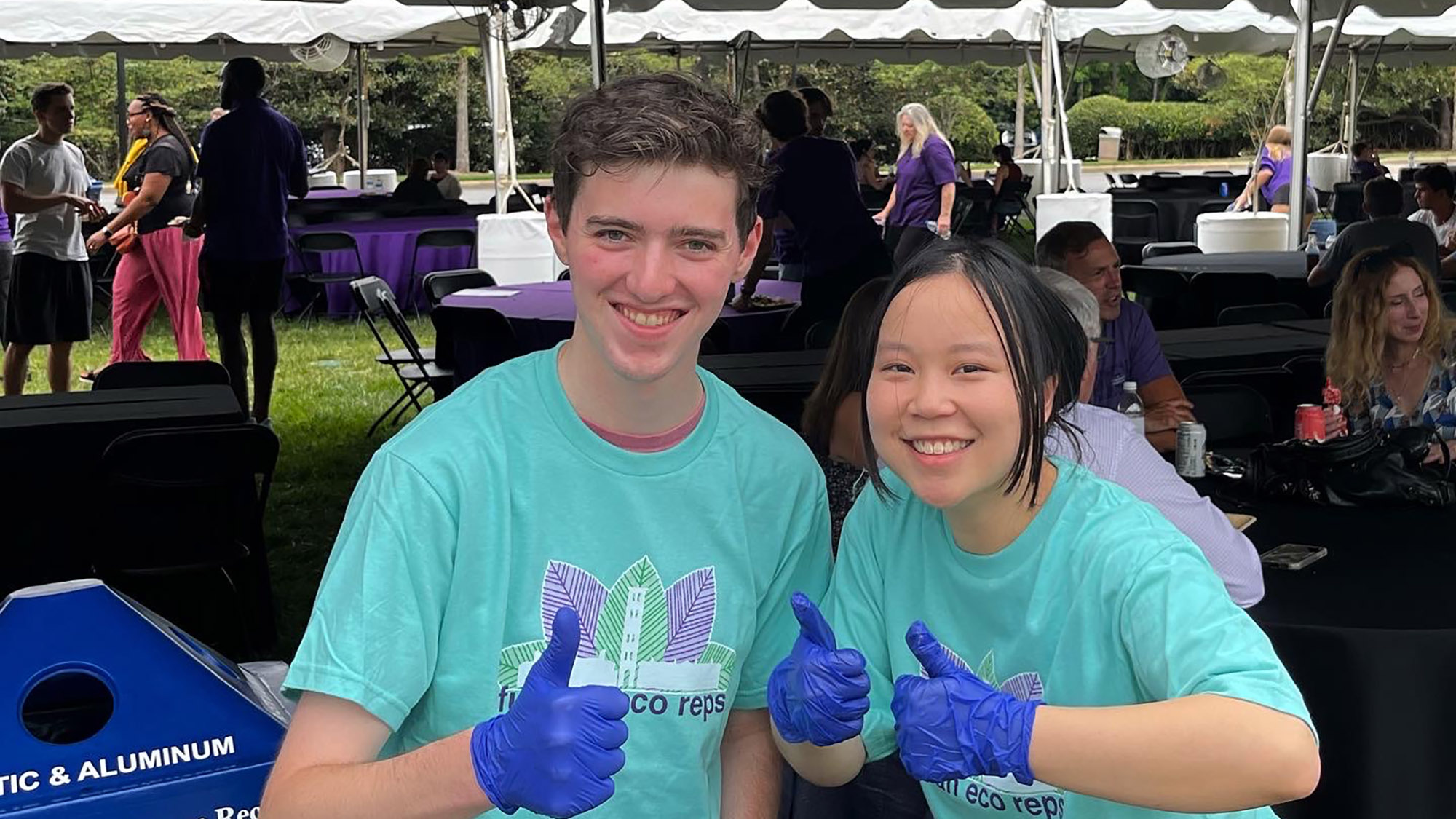Eco Reps take sustainability education peer to peer

On Feb. 8, when the Paladins women’s basketball team faces UNC Greensboro, a group of sustainability-minded students is planning for the big winner to be the environment.
Zero Waste Game Day is a class project for the members of Furman’s Greenbelt Engaged Living Community, a residential living/learning community based in cabins by Furman Lake. As the name implies, the goal is to keep as much trash as possible out of the landfill. Zero Waste Game Days at other universities have diverted upward of 90% of the waste produced through composting and recycling.
For instance, styrofoam clamshell food containers are the biggest source of non-compostable, non-recyclable trash at the games in Timmons Arena that the Greenbelt students studied, said Joy Baker ’14, associate director of sustainability programs for The Shi Institute for Sustainable Communities, who supervises the Greenbelt Community. On Zero Waste Game Day, there will be a compostable alternative.
It’s a big task, and “they need manpower to pull that off,” said Baker. So, another program she oversees is answering the call.
The student volunteers in Furman Eco Reps have gotten experience helping manage zero-waste events during the last few Opening Convocation celebrations. Stationing themselves near recycling and composting bins under tents on the Furman Mall, they guided the hundreds of people eating lunch there to dispose of their compostable plates and utensils and other waste properly.
“The reps’ role is to do that education piece, especially because we have a lot of first-year students who haven’t seen a Furman waste stream before,” Baker said. “We end up diverting almost all of that waste from the landfill because of their efforts.”
Peer to peer
Peer-to-peer education is the prime motive of the national network of Eco Reps programs that Furman joined in 2018. Each of the 23 current reps is assigned to one of Furman’s eco-regions – one residential building or hall or one section of North Village, for example. Their role is to let the residents of that eco-region know about the various sustainability programs Furman offers, such as its residential composting.
“Furman composts all the food waste in the Dining Hall,” Baker explained. “But students who didn’t eat in the Dining Hall so much, especially students in the apartments, were also expressing interest in diverting food waste from the landfill.”
The Eco Reps distribute compost bins to be filled in a dorm room or apartment and coordinate with The Shi Institute’s student recycling fellow to pick up the compost. The food waste can then be composted on the Furman Farm. On average, volunteers pick up nearly 5 pounds of compost per week across campus. Overall, in most years the farm composts more than 40 tons of food waste.
Last semester, 24 students signed up for the composting program, and 41 received Green Living Certification by taking a graded survey.
‘You can’t look away’
The Eco Reps’ two current student leaders, The Shi Institute Eco Rep Fellows Molly McCutcheon ’24 and Stella Frisbie ’25, were both attracted by Furman’s sustainability classes and programs during their college searches, and both have been Eco Reps since their first years.
“I became passionate about sustainability and the environment in high school,” said McCutcheon. “Once you learn about it, you can’t look away from it. You can’t separate it from your outlook on life.”
Originally planning to major in sustainability science, McCutcheon, recipient of a Charles H. Townes Scholarship, eventually decided on a double major in Japanese studies and mathematics, but said she is “still really excited to make a difference as an Eco Rep.”
“When I was an incoming first-year student, I came across the Eco Reps program,” said Frisbie, who also originally considered a sustainability science major and is now pursuing a B.S. in biology on the environmental and conservation biology track. “I wanted to make positive sustainable change on campus, and I wanted to get to know people who held the same values.”
Beyond the Zero Waste Game, “the new reps are really excited to take on more responsibility,” Frisbie said. “They want more events. They want to volunteer their time more. That’s really exciting for the future.”